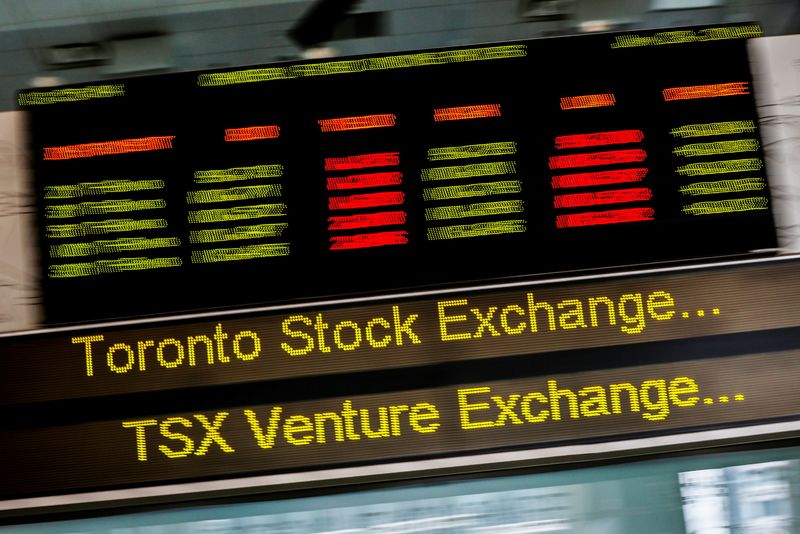Toronto market seen higher in 2022, 2023 despite selloff fears: Reuters poll
2022.08.24 04:14

FILE PHOTO: A sign board displaying Toronto Stock Exchange (TSX) stock information is seen in Toronto June 23, 2014. Canada’s main stock index was little changed on Monday as weakness in financial and energy shares offset gains in the materials sector.
By Fergal Smith
TORONTO (Reuters) – Canada’s main stock index is expected to advance through the end of the year and then approach a record peak in 2023 as high commodity prices bolster resource company earnings and despite the risk of another major sell-off, a Reuters poll found.
The median prediction of 24 portfolio managers and strategists polled Aug. 9-23 was for the S&P/TSX Composite Index to advance 2% to 20,375 by the end of this year from Monday’s close of 19,974.92.
While that’s well below the 21,183 year-end forecast in May’s poll, the index was then expected to surge to 22,000 by the end of 2023, taking it within a whisker of its March 29 record closing high of 22,087.22.
“The outlook for the remainder of 2022 is encouraging given the expected contribution from the energy sector, financials and overall valuation of the S&P/TSX Composite Index,” said Philip Petursson, chief investment strategist at IG Wealth Management.
“The strength in oil prices and commodities in general as we head into 2023 should continue to be positive for the index.”
Oil has pulled back from the peak levels seen in March but has still advanced nearly 20% since the start of the year. Together, the energy and materials sectors account for 29% of the TSX’s market capitalization.
Still, the Toronto market has not escaped the volatility that has buffeted financial markets this year as central banks globally tighten monetary policy to tackle soaring inflation.
The index has rallied nearly 10% from its July trough but is still down almost 6% since the start of 2022.
Since March, the Bank of Canada (BoC) has raised its benchmark interest rate by 225 basis points to 2.50%, including a full-percentage-point move in its last policy decision in July, the biggest single hike by a G7 country in this economic cycle.
“Signs of cooling inflation make the case for the BoC to slow the pace of tightening, but we don’t think the coast is clear yet,” said Angelo Kourkafas, investment strategist at Edward Jones.
“The additional rate hikes will continue to pose strong headwinds for consumer spending, the housing market and economic growth over the remainder of the year.”
Most investors that answered a set of separate questions expected volatility to rise over the coming three months and see chances of another major sell-off as high or very high.
“I am not in the hard-core recession camp, but the risks are evident,” IG’s Petursson said. “If we continue to see a deterioration of economic conditions, earnings downgrades won’t be too far off.”








